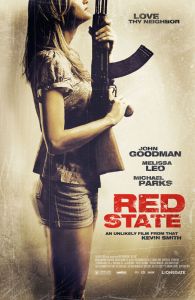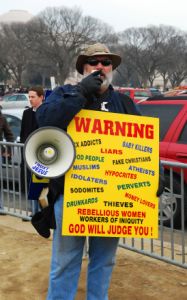 What is the Christian equivalent to Islamic terrorism? Director Kevin Smith, known for his comedies and religious-themed films like 1999's Dogma, is hoping to answer this question with his new film Red State, a realistic fictional account of fundamentalist Christian terrorists who kill "sinners" in order to cleanse society of moral depravity in the name of Jesus Christ. Naturally, the average Universal Life Church minister will deem such extremism as repugnant, but there are some individuals out there who genuinely question whether a Christian parallel to Islamic terrorism exists in real life. If we think about it, though, we can come up with several examples how Smith's film reflects real-life events.
What is the Christian equivalent to Islamic terrorism? Director Kevin Smith, known for his comedies and religious-themed films like 1999's Dogma, is hoping to answer this question with his new film Red State, a realistic fictional account of fundamentalist Christian terrorists who kill "sinners" in order to cleanse society of moral depravity in the name of Jesus Christ. Naturally, the average Universal Life Church minister will deem such extremism as repugnant, but there are some individuals out there who genuinely question whether a Christian parallel to Islamic terrorism exists in real life. If we think about it, though, we can come up with several examples how Smith's film reflects real-life events.
Central to the film (to be released 25 September) are the cruel exploits of a fanatical Christian cult and the length to which its members are willing to impose their distorted view of Christian morality using the most horrifyingly sadistic methods imaginable. (The film's warning against violent sectarian bigotry will resonate strongly with those who seek to become an ordained pastor in an interfaith church in order to promote peace and tolerance.) The plot tells the story of three teenage boys who drive out into the country to meet with a woman who has invited them to have group sex with her through an Internet sex site. Unbeknownst to the boys, the woman is a member of the fictional Five Points Church, a terrorist church led by the zealous pastor Abin Cooper which punishes sinners by killing them; the woman's invitation is actually a trap set up by church members. The boys are abducted, tortured, and eventually killed by church members, and the FBI is charged with the task of closing in on the church compound and wresting control from its members in a Waco-style confrontation.
According to Smith, the film is inspired largely by churches such as Westboro Baptist Church (WBC), a fanatical church in Topeka, Kansas headed by Fred Phelps. The church, members of which are infamous for picketing military funerals with signs reading things like "God hates fags" and "God hates America", is widely considered a hate group by social advocacy organizations such as the Anti-Defamation League and the Southern Poverty Law Center, and is already familiar to many Universal Life Church officiants. Red State takes the theology and activities of churches like WBC to the "absolute extreme", Smith tells Joe Utichi of The Guardian, and attempts to illustrate what torture and murder on the part of Christian extremists would look like in modern-day America. Phelps and his followers have not taken kindly to the insinuations made by Smith in the film. Responding to Smith's claim that the film was inspired by their church (but depicts a much more extreme form of fundamentalism), the WBC protested the film's premiere at the January, 2011 Sundance Film Festival.
 But if Red State exaggerates the malevolence of churches like WBC for the sake of illustration, have we no reason, as nondenominational ministers ordained online, to fear Christian terrorism in real life? There is good reason to believe we do, since there are other real-life examples of such terrorism which arguably match that depicted in Smith's film. A common argument used to downplay the reality of Christian terrorism is that Christianity has "cooled down" over the centuries, and most of the violence committed in the name of Christ reached its apex in the medieval and early modern periods. Modern-day Christianity, goes the argument, has reached a level of maturity characterized by calm benevolence. On the other hand, Islam is still rife with fanaticism, argue supporters of this view. Yet we are familiar with modern-day cases of fundamentalist Christians murdering abortion providers, and only recently a Christian named Anders Behring Breivik murdered seventy-seven of his own people in Norway as part of an attempt to revive the European Christian crusades against the spread of Islam. Given that such Christians use terror to leverage support for their religious cause, it seems only logical to call them Christian terrorists.
But if Red State exaggerates the malevolence of churches like WBC for the sake of illustration, have we no reason, as nondenominational ministers ordained online, to fear Christian terrorism in real life? There is good reason to believe we do, since there are other real-life examples of such terrorism which arguably match that depicted in Smith's film. A common argument used to downplay the reality of Christian terrorism is that Christianity has "cooled down" over the centuries, and most of the violence committed in the name of Christ reached its apex in the medieval and early modern periods. Modern-day Christianity, goes the argument, has reached a level of maturity characterized by calm benevolence. On the other hand, Islam is still rife with fanaticism, argue supporters of this view. Yet we are familiar with modern-day cases of fundamentalist Christians murdering abortion providers, and only recently a Christian named Anders Behring Breivik murdered seventy-seven of his own people in Norway as part of an attempt to revive the European Christian crusades against the spread of Islam. Given that such Christians use terror to leverage support for their religious cause, it seems only logical to call them Christian terrorists.
Whether or not Smith's film exaggerates the magnitude of Christian terrorism, it does to an extent reflect real-life religious violence, as we see in the murder of abortion providers and terrorist acts like the Norway massacre. Of course, the Universal Life Church Monastery stands for peace, tolerance, solidarity, and mutual understanding, and condemns such crimes in the name of religion. Films like Red State, despite their grim depiction of the subject matter, may have value in forcing people to ponder the ominous specter of religious terrorism lurking in their own backyard, among the least likely of suspects. Give us your thoughts as an ordained ULC minister. Can films in the emerging "religious horror" genre (if in fact such a genre can be said to exist yet) serve as a warning against the darker side of extreme religious devotion?
Source:


0 comments